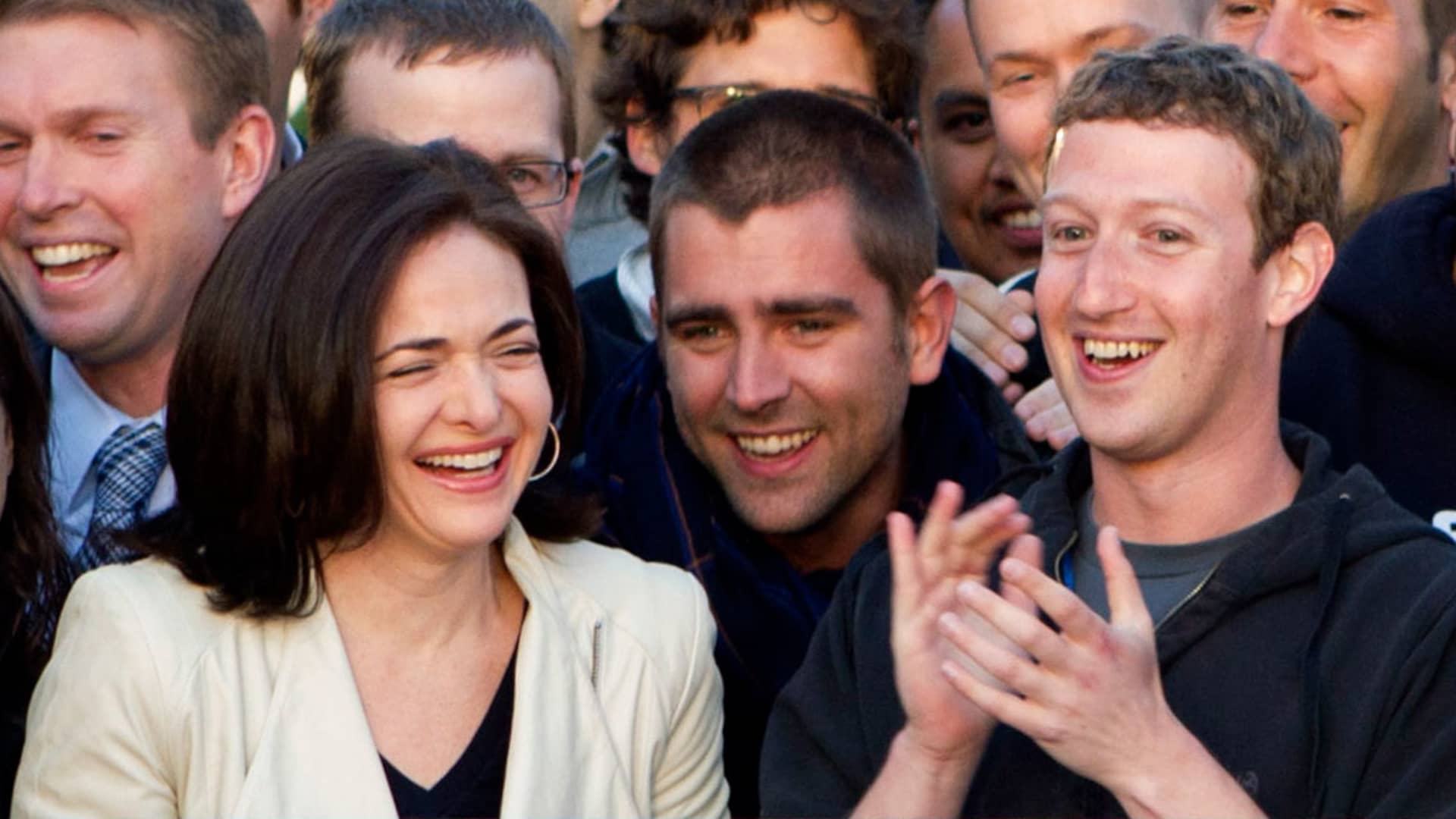
When Facebook held its Nasdaq debut 10 years ago, the prospectus named six executive officers.
Only one still remains: Mark Zuckerberg.
Sheryl Sandberg announced her departure from the company, now named Meta, on Wednesday, leaving behind a complicated 14-year legacy at the social media giant, a job that turned her into a billionaire and one of the most powerful women in the business world.
In 2012, she was seen as so crucial to Facebook’s credibility with customers and investors that the company’s IPO filing named her as one of two key people.
“We currently depend on the continued services and performance of our key personnel, including Mark Zuckerberg and Sheryl K. Sandberg,” Facebook wrote in the risk factors section of its prospectus.
The language stuck, and is repeated all the way through the company’s latest annual filing. But it’s become increasingly divorced from reality.
In the last few years, Sandberg’s star has faded, as unflattering reports emerged of her mishandling of the Russian disinformation story following the 2016 presidential election. According to a 2018 report in the Wall Street Journal, Zuckerberg blamed Sandberg for the fallout over the scandal surrounding Cambridge Analytica, the data analytics firm that improperly used Facebook profiles for political research.
As a champion of women in tech, Sandberg also caught flack last year after former employee Frances Haugen revealed internal documents showing the company knew its products could harm the mental health of teenage girls — and refused to make changes.
Investor Whitney Tilson published a letter he wrote to Sandberg in October, after Haugen appeared on “60 Minutes.”
“Horrified doesn’t even begin to describe my feelings,” Tilson wrote. “If you and Mark think that you can run the old playbook that’s worked every time in the past – apologize and take a few token steps, but not really change anything – and that this will just blow over, you are sorely mistaken.”
Sandberg, 52, continued to appear on earnings calls to talk about the ad business and issues like regulation. There, too, she’s found herself in a difficult spot. Far from its days as a Silicon Valley growth engine, Facebook recently reported its first-ever quarter of growth under 10%, and said that revenue in the second quarter could decline from a year earlier.
“The company needs to find a new way forward, and perhaps this was the best time for Sandberg to depart,” Debra Aho Williamson, an analyst at research firm Insider Intelligence, wrote in an emailed statement.
Zuckerberg has tried to change the conversation, focusing on the metaverse and a future of virtual leaning, play and work. In his new world, Sandberg was an outsider.
During the 77-minute presentation in October that Zuckerberg used to announce the name change and to show off what Meta is trying to build, the company’s No. 2 was nowhere to be found.
Still, Zuckerberg praised Sandberg on Wednesday, declaring it the “end of an era.” While Javier Olivan, Meta’s chief growth officer, will assume the title of chief operating officer later this year, Zuckerberg wrote in a Facebook post that he doesn’t plan to replace Sheryl’s role and, “I’m not sure that would be possible since she’s a superstar who defined the COO role in her own unique way.”
‘Move fast and break things’
Fourteen years older than Zuckerberg, Sandberg brought to Facebook a hefty resume from her years at Google and her work in Washington as part of former President Bill Clinton’s Treasury Department. Zuckerberg, by contrast, was a college dropout who’d never had a real job.
Sandberg had an undeniable impact on building Facebook’s advertising business and its internal operations, including marketing and human resources. But the vision of the company has always been crafted by one person and one person only. For Zuckerberg, realizing that vision was a task for engineers.
“We have a saying: ‘Move fast and break things,'” Zuckerberg famously wrote in his letter to prospective shareholders in the IPO filing. “The idea is that if you never break anything, you’re probably not moving fast enough.”
For Zuckerberg, moving fast meant serving as Facebook’s singular head of business development for some of its most important decisions. He offered to buy Instagram shortly before the IPO without input from the board, and he reportedly orchestrated the $19 billion purchase of WhatsApp after seeing data that showed the messaging app was an existential threat to his business.
Sandberg joined Facebook’s board in 2008, and indicated on Wednesday that she will continue to serve as a director. But Zuckerberg has permanent control over voting rights for the company’s stock, thanks to his super-voting shares. That means he gets to choose the board members who will adhere to his vision.
That’s why Zuckerberg gets to decide when he wants to change the name of the company to Meta and spend $10 billion this year building a metaverse that may or may not turn into a real business by the end of the decade.
Sandberg told CNBC that she’s planning to focus on philanthropy, specifically helping women, adding that she’s “very optimistic about the future of the company.”
But investors have been bailing, with the stock losing half its value since peaking in September. It dropped another 2.6% in extended trading after Sandberg announced her departure.
Whatever happens now, Zuckerberg has nobody to blame but himself.
— CNBC’s Julia Boorstin contributed to this report.
WATCH: Sandberg says decision to leave about focusing on philanthropy




